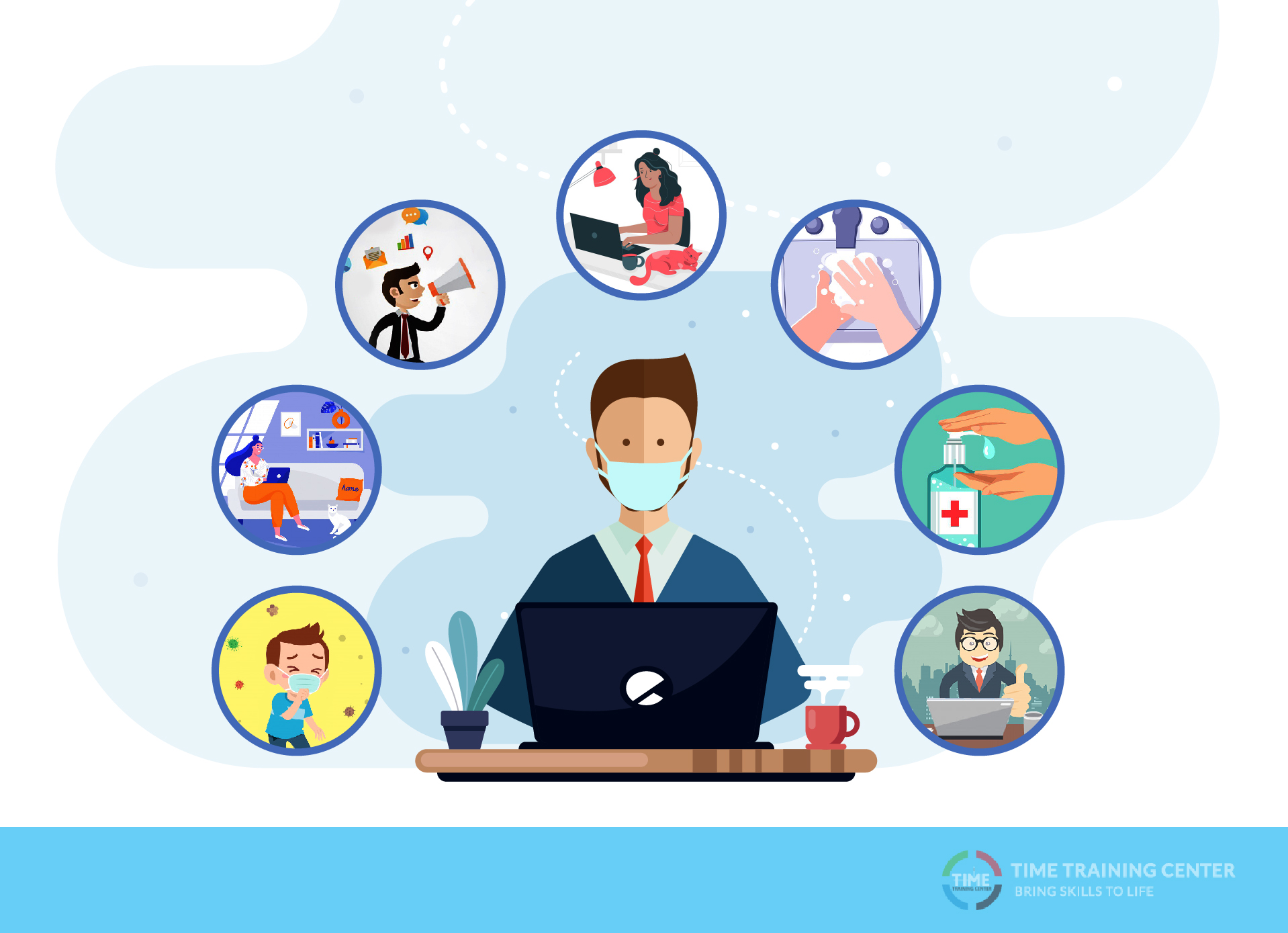Amidst the rapidly progressing COVID-19 or coronavirus outbreak across the world, it’s vital that HR professionals respond quickly to the on-demand situation in a specific workplace.
Whilst, the situations grow severe, many governments worldwide are urging businesses and individuals to adopt social-distancing and self-isolation measures, limiting your contact with other people, to reduce the spread of the virus.
COVID 19 has also urged many governments to order massive shutdowns for businesses and working offices where possibilities of disease spread are sure. However, shutting down a factory or a large organization is never an easy call. In the face of growing concerns about the coronavirus, more businesses are opting for it rather than risk spreading infection among employees and their families.
Considering the responsibilities of HR within an organisation, the first priority should be safeguarding your workers, ensuring their immediate health and safety, followed by their economic well-being. Your business, however, has to maintain continuity and keep financing amidst complete or partial lockdown. This could be possible by letting them work from home.
With this in mind, here's an overview of the current coronavirus situation, followed by the 7 key measures that HR should take for COVID-19 to minimise disruption, reduce employee risk and maintain profitability.
What is COVID 19?
The novel coronavirus disease 2019 which is currently known as COVID-19 is a respiratory illness that can spread from person to person. The outbreak first started in China, but the virus continues to spread internationally crossing the death toll of 16,000 (as on March 24, 2020).
Studies have shown that 80% of people with COVID-19 have mild cases of the illness, with 20% experiencing more severe illness requiring hospital treatment. The majority of virus-infected patients recover within a few weeks.
The World Health Organisation estimates that the new virus kills roughly 3% of people it infects. The elderly with pre-existing health conditions such as diabetics, heart problems and other respiratory illnesses are at particular risk.
Those who're infected display the symptoms which are very similar to that of the flu or cold, which makes diagnosing the condition difficult and impossible without a test.
The most common symptoms are:
-
A high temperature
-
A cough
-
Shortness of breath
How employers should respond to COVID 19?
As the Coronavirus is now spreading through community transmission, all employers and employees are affected in some way. Your employees’ health and well-being, and measures to prevent the virus from spreading, should be at the heart of responsibility.
Stay Informed and Be Prepared
Since COVID 19 is a fast-moving issue, HR or a company's management professionals should keep up to date with the Government and public health service's advice on the situation as it develops. If you need more correct information, use official and expert medical sources such as WHO and the National Health Service to refer employees who are concerned about the infection.
Be always prepared to prevent the infection from spreading. These preventive measures include:
-
Ensuring workplace hygiene
-
Promoting regular and thorough hand-washing
-
Providing your employees with an alcohol-based hand rub/sanitizer.
-
Encouraging employees to dispose of used tissues correctly.
-
Advising your employees on the travel ban and offering guidelines if necessary.
7 Key Measures that a Company HR should take for COVID-19
1.Create an infectious-disease management plan
Creating a dedicated infectious-disease management plan to deal with COVID-19 at your workplace will help your business to prepare for most emergency situations and minimise disruption.
An infectious-disease management plan is essentially a collection of different policies related to COVID 19. It will usually cover subjects like:
-
Mandatory reporting of employee exposure
-
Quarantine or isolation policies for employees who are sick, or have travelled to affected countries
-
Workplace shutdowns
-
Employee travel restrictions
-
Communication policies
To help coordinate the efforts your organisation will require to establish a cross-functional emergency team. Setting up this plan will help to give a focus to your preparations.
2.Establish a work-from-home policy
The key to mitigating the impact of coronavirus on society is to slow its spread. One of the most effective ways to do this is to self-isolate. Self-isolation in terms of work generally involves working from home. It will help minimise your personal contact with other people either at the workplace or outside.
To minimise the impact of the coronavirus on your business a home working policy is useful. Considering the nature of the work of each employee, you can assign tasks to be completed at home. A large proportion of jobs in most workplaces during this pandemic period is done at home. The success of it depends on how your company trusts your employees to do their job whilst at home.
3.Inform and Educate Employees
HR professionals have a duty, to be honest with employees about what the impact of coronavirus is likely to be at their company. You need to be transparent about the measures your company is taking to reduce the impact.
Nothing breeds panic more than misinformation and ignorance. You must take adequate measures to counter misinformation on COVID-19 to promote peace at work. Make sure that you base your judgments for action on evidence from reputable, verified sources like the World Health Organisation, the Government, or other local health services.
4.Create a flexible-working policy
Since the outbreak has worsened, schools are all closed.When it comes to employees with children this will likely cause shortages of childcare services. Attempting to find someone to look after their children whilst they’re at work is not possible during these circumstances as there are chances for disease spread is prevalent. Therefore, have a plan to support parents if schools are closed. What you can do as an HR person is to create a sensible, flexible-working policy to support your employees.
Every age group can catch COVID-19, but people in the age group of 50 or above appear to be more vulnerable to severe illness than others. The people who are more at risk are the elderly, people with serious underlying health conditions, and people with compromised immune systems.
If you have employees with these conditions, consider adopting a flexible working approach letting them work from home and self-isolate. It will help them to reduce their risk of infection.
Be proactive and don’t wait for the situation to worsen. Put inadequate safety measures.
5. Display hand-washing and hygiene information
Display hand-washing and hygiene information
We consider washing our hands a simple task, but it is not in the same way we usually do. The World Health Organisation and the medical experts instruct on how we should wash our hands so that the risk of infection is reduced.
Display these handwashing guidelines in your workplace above sinks or share it with your employees if they're working from home. This handwashing method is practised by medical staff to prevent infections from spreading when they’re treating patients.
Along with the need to wash hands with soap for around 20 seconds, it’s also vital to stress the importance of employees avoiding touching their faces. Viruses like COVID-19 enter your body through mucous membranes which are found in your nose and mouth. Which means you’re potentially letting a virus enter your body each time you touch your face.
It only takes one microscopic microbe to cause an infection, therefore, avoid touching your face if you’ve happened to socialise with others.
6. Establish hand-sanitizer stations
Hand-sanitizer is a useful way to temporarily clean your hands when you don’t have access to water and soap. But, it’s not as effective as washing them with soap and hot water. Most people do not know the real use of sanitizers. So as an HR person you should clear their doubts regarding when, where, and how to use hand sanitizers?
Ideally, you should wash your hands before you touch food or eat, after using the toilet, after blowing your nose, coughing or sneezing, and after touching any surfaces that any other people may have touched.
If you’re able to provide hand sanitizer, establish hand-sanitizing stations around your workplace at high-traffic areas such as entrances and exits. Or else, you can remind your employees to practice this habit before they enter their home from outside.
7. Be Prudent and stay cool
During such a serious crisis as COVID 19, the most important action that HR professionals should take is to act prudently and to stay calm.
Staying cool means putting the virus in perspective. Also, you need to have the realization that blind panic often causes more harm than good in the long-term.
Let’s Conclude
These guidelines that HR professionals should take to prevent COVID-19 at the workplace will be useful for corporate companies for Corporate training purposes and company management professionals. By acting now, you can minimize the impact of coronavirus in your organization and your colleagues.
While considering the above actions, the HR staff should make sure that employees are using their health, wellness, and leave benefits to stay healthy or recover from the new coronavirus.
 +971 2 6713828
+971 2 6713828




